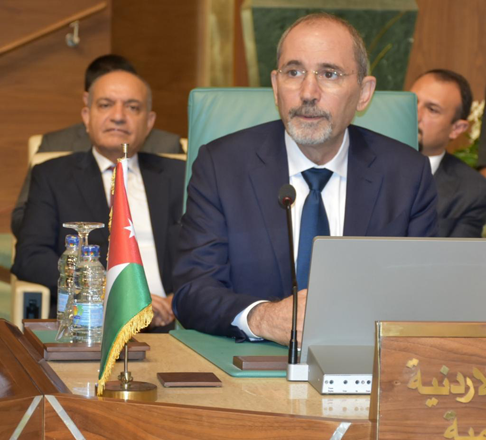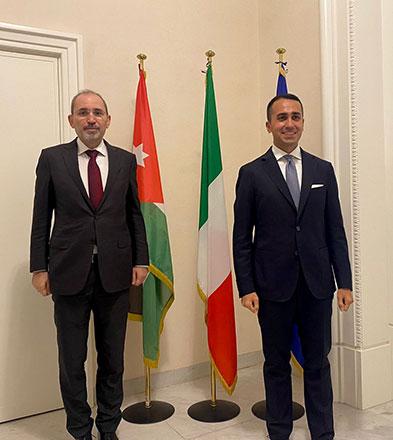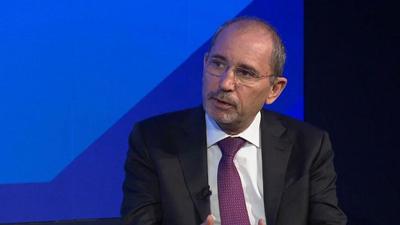You are here
FM stresses joint Arab action to overcome regional crises
By JT - Sep 06,2022 - Last updated at Sep 06,2022

Deputy Prime Minister and Foreign Minister Ayman Safadi takes part in the 158th regular session of the Arab League Council at the ministerial level in Cairo on Tuesday (Photo courtesy of Foreign Ministry)
AMMAN — Deputy Prime Minister and Foreign Minister Ayman Safadi on Tuesday participated in the 158th regular session of the Arab League Council at the ministerial level in Cairo, according to a Foreign Ministry statement.
Beginning his speech, Safadi said, “We meet again, in a difficult time for Arabs, in which crises intensify, and others erupt.”
“The prospects for solutions are absent. The suffering of brotherly peoples increases, and our entire region bears the consequences of these crises: Security threats and economic pressures, the displacement of millions, and the loss of generations,” he added.
He stressed the importance of launching an initiative joint Arab action which dedicates resources and exerts effort to overcome crises afflicting the Arab world, achieving stability, development and prosperity.
Safadi warned of the danger of undermining the two-state solution, adding that “the continuation of occupation pushes the region towards more conflict, where there is no peace, security or stability without meeting all rights of the Palestinian people”.
The foreign minister described any proposal for a solution that does not meet Palestinians' right to freedom and an independent, sovereign state on their national soil as “absurd fantasies".
He stressed that "the apartheid inevitably dooms the two-state solution”, calling it a “hideous, inhumane condition, and a path to conflict, not peace".
“Palestinians are still suffering from the scourge of occupation. Their land is plundered. Their economy is restricted. Their right to freedom and a sovereign state is violated. Our Jerusalem and its sanctities are facing the threat of identity change under Israeli violations,” he said.
Safadi said that the two-state solution, which the majority of the world agreed to be the only way to peace, is being undermined by illegal Israeli measures, including constructing settlements, plundering lands, and displacing Palestinians.
Intensifying joint efforts is a must to push for a return to real negotiations to achieve peace on the basis of the two-state solution, which embodies the independent, sovereign Palestinian state, with Jerusalem as its capital, on the lines of June 4, 1967, he continued.
Undermining the two-state solution will cause more regional injustice, oppression and conflict, he warned.
“The Kingdom, as you have chosen, has chosen peace as a strategic objective,” he said, adding that “we want a lasting, just and comprehensive peace to achieve security and stability and provide necessary conditions for cooperation and development.”
Addressing regional challenges necessitates regional cooperation, he said.
“Such cooperation is conditioned by materialising a just solution to the Palestinian issue, as there is no development without stability,” he said, noting that “there is no stability, no security, and no peace without fulfilling the rights of Palestinians.”
“Turning a blind eye to the Palestinian issue is an illusion,” he said, noting that UNRWA must continue to provide its vital services to Palestinian refugees, in accordance with its UN mandate.
UNRWA’s fiscal deficit threatens its ability to fulfil its duties and eliminating that deficit requires Arab and international contributions to UNRWA’s budget, he said.
Turning to the Syrian crisis, Safadi stressed the importance of crystallising an Arab mechanism to resolve the crisis in a manner that preserves Syria, protects its people, and prioritises its interests over conflicting regional and international agendas.
“Let us protect the right of Syrian refugees to live in dignity. Aid for them is dwindling, but their needs are growing. Host countries cannot bear this responsibility alone. Meeting the needs of refugees is an international responsibility,” he said.
Safadi highlighted the need to resolve crises in Libya and Yemen and prevent further deterioration in Lebanon.
Supporting Iraq's stability and security is an Arab duty and a necessity to preserve the stability of the region, he said.
He also referred to Egypt's water security as “an integral part of our national security”.
Stressing the need to end the tension in the Arab Gulf region through a dialogue that ensures good neighbourly relations based on the principle of non-interference in the internal affairs of Arab countries, Safadi described the security of Jordan and the Arab Gulf states as indivisible.
He called for building relations with Iran in order to enter a new era of cooperation.
The Kingdom will remain a partner in activating joint Arab action, calling for comprehensive Arab cooperation, supporting Palestinian rights, devoting all its capabilities to protecting Islamic and Christian holy sites in occupied Jerusalem, which constitutes a priority for His Majesty King Abdullah.
“We will work to confront climate challenges, achieve health and food security, increase economic cooperation that creates job opportunities, achieve Arab integration and comprehensive development,” he said.
In addition, Safadi met with Egyptian Foreign Minister Sameh Shoukry, Saudi Foreign Minister Prince Faisal Bin Farhan, Kuwaiti Foreign Minister Sheikh Ahmed Nasser Al Mohammed Al Sabah and Algerian Foreign Minister Ramtane Lamamra to discuss regional developments and furthering bilateral relations.
Safadi also held a meeting with Moroccan Foreign Minister Nasser Bourita and Libyan Foreign Minister Najla Mangoush.
The Jordanian foreign minister discussed bolstering cooperation with Oman Foreign Minister Badr Busaidi, Tunisian Foreign Minister Othman Jerandi, Bahraini Foreign Minister Abdullatif Bin Rashid Al Zayani, Yemeni Foreign Minister Ahmed Bin Mubarak, Somali Foreign Minister Abshir Omar Huruse, Mauritania Foreign Minister Ismail Ould Cheikh Ahmed and Arab League Secretary-General Ahmed Aboul Gheit.
Related Articles
AMMAN — Deputy Prime Minister and Foreign Minister Ayman Safadi on Tuesday held talks with Dutch Foreign Minister Sigrid Kaag, in a phone ca
AMMAN — Deputy Prime Minister and Foreign Minister Ayman Safadi and his Italian counterpart Luigi Di Maio on Monday in Rome held a session i
AMMAN — Deputy Prime Minister and Foreign Minister Ayman Safadi on Tuesday warned against the continued absence of prospects for a just and


















